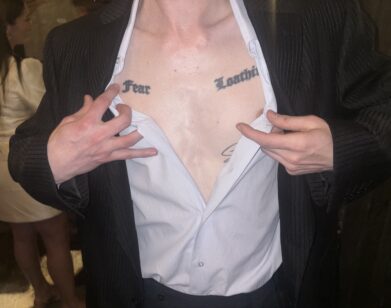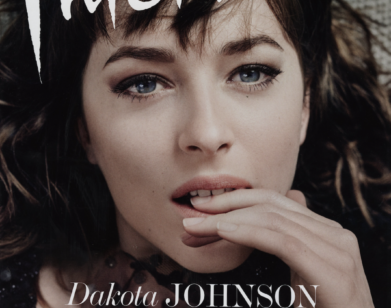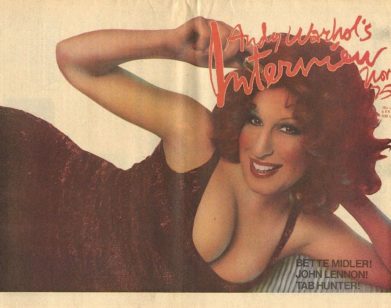In Conversation
Cooper Raiff and Hovvdy Want to Make You Feel Good
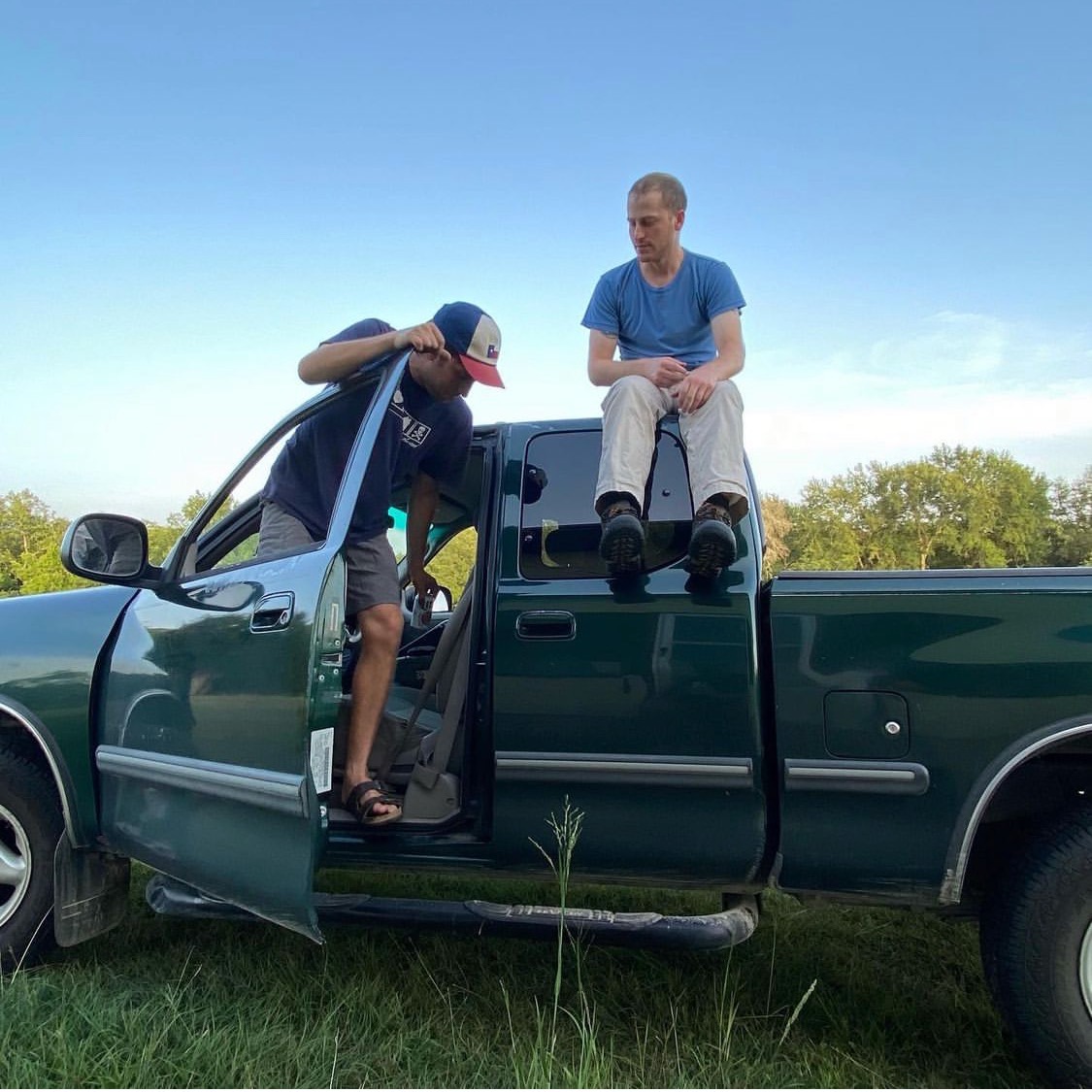
Photo courtesy of Hovvdy.
Cha Cha Real Smooth was the darling of the 2022 Tribeca Film Festival, owing to a charismatic performance by Cooper Raiff, who wrote, directed, produced and starred in the film. Raiff also directed and starred in the nanobudget 2020 production Shithouse, a tender coming-of-age dramedy about a lonely college freshman who forges an unlikely relationship with his RA after they meet at a frat party. Cha Cha Real Smooth, which follows Andrew (played by Raiff), a lost college graduate with an uncertain future, feels like a logical progression in Raiff’s still-fledgling oeuvre. Andrew returns to his hometown after college, where he (cupid) shuffles into a job as a party MC and befriends Domino (Dakota Johnson), a young single mother, and her daughter. When crafting the soundtrack for the film, Raiff turned to genre-bending indie duo HOVVDY (made up of Will Taylor and Charlie Martin), whose dreamy, lo-fi song Tools graces one of the film’s climactic final scenes. The band’s atmospheric synth and ethereal vocals echo feelings of youthful alienation and the search for connection that define Raiff’s work. The director and musical duo are also all Texas natives—something that’s easy to discern from the Texas high school gear that Raiff wears in both films, and from the syrupy southern drawl in Hovvdy’s vocals. Here, the trio called in from three different corners of the country to talk Tex-Mex, true love, and True Love. —CAITLIN LENT
———
WILL TAYLOR: It is so nice to meet you.
COOPER RAIFF: It feels like we know each other already, but we really don’t. I’m so excited to have a conversation with you guys.
CHARLIE MARTIN: We’ve been admiring each other’s art for a while.
TAYLOR: Where are you right now?
RAIFF: I’m in Los Angeles. Where are you guys?
MARTIN: I’m in Mississippi right now at my mother-in-law’s house.
TAYLOR: I’m in Texas, we just finished a tour that felt like forever, but it was a fun one. Happy to be home.
RAIFF: I should know this, but where are you guys from originally?
TAYLOR: We’re from Dallas.
RAIFF: You’re from Dallas too, right. You guys have the charming southern drawl, I’m so sad that I lost mine. I don’t have that deep drawl that you guys both have. I noticed that when I went–I’ve been to so many of your concerts, so I actually have seen you quite a bit in person.
TAYLOR: Which shows?
RAIFF: My girlfriend and I went to the last New York show. We always quote something that Will said at that show. Charlie was tuning his guitar and it got really quiet for a second and he was like, “Oh, sorry.” And Will goes “It’s okay, we’re rockin’ here, Charlie.” [All laugh] So now we always say to each other, “It’s okay, we’re rockin’ here Charlie.”
MARTIN: We get nervous when we’re tuning our guitars, and all kinds of things come out.
TAYLOR: That’s when we’re most insecure.
RAIFF: Is it weird if I ask you questions for Interview?
TAYLOR: No, it’s great. We have some questions for you too.
RAIFF: I wrote down the questions, because I’ve never interviewed anyone before, but if there were two people in the world that I’d want to interview, it would be you guys.
TAYLOR: That’s really sweet.
MARTIN: I re-watched Shithouse and then I watched Cha Cha last night, in succession, and it felt like checking in with you at two stages of your life. It’s the same wit and emotional intelligence, but just a little bit further down the road. In both movies you’re learning, but you’re also walking people through the emotionally challenging moments. Did that continuity between the films happen naturally, because you’re directing and acting and you have so much creative control?
RAIFF: I think it’s natural since I made them pretty close together. But I also think the throughline is that both characters don’t really know who they are, apart from other people, or how to take care of themselves. I didn’t do that on purpose at all, but I think at the end of each writing process I realized, “Man, I still don’t want to be alone.”
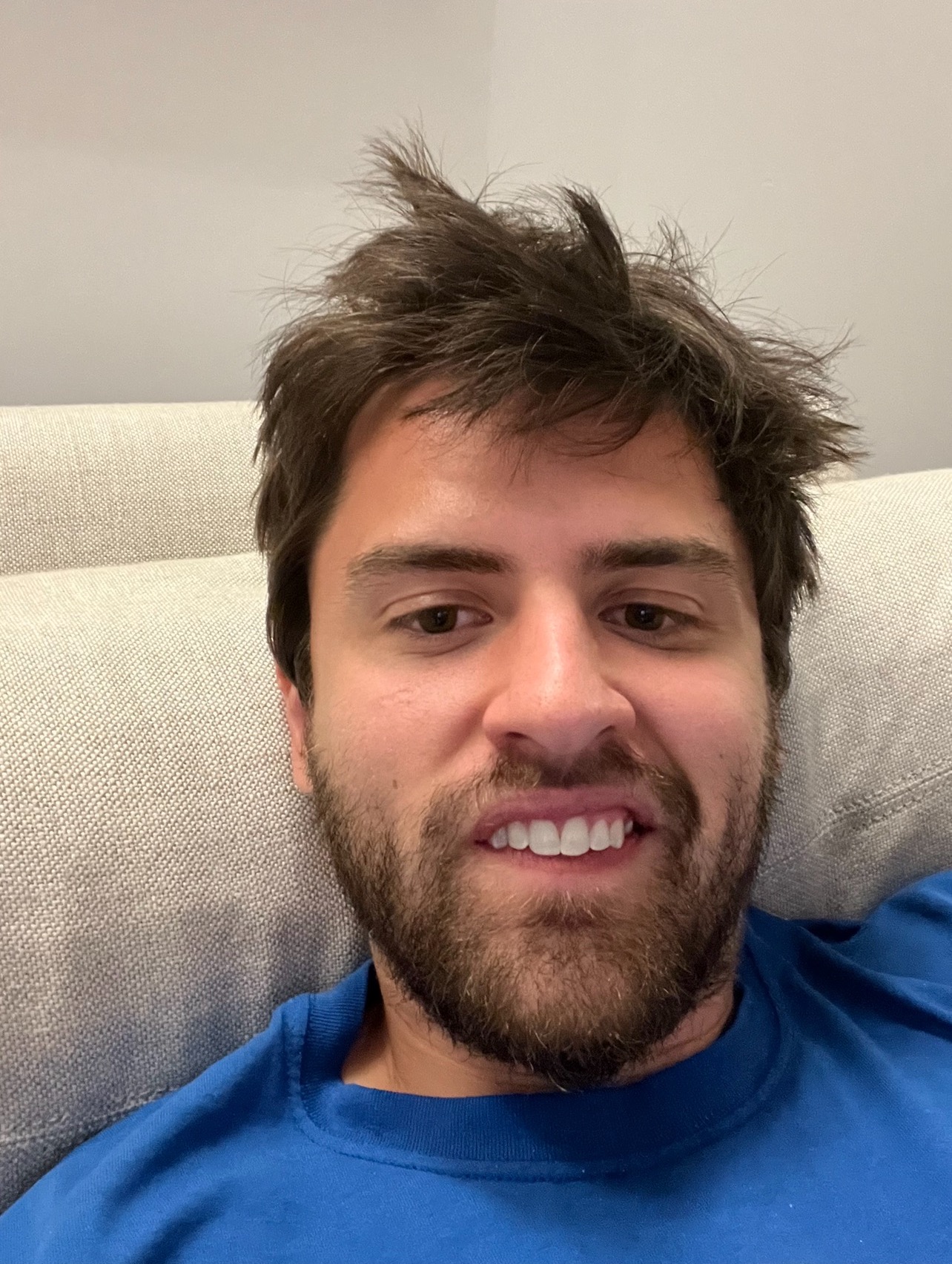
Photo courtesy of Cooper Raiff.
TAYLOR: Alone in a room.
RAIFF: They both have that desperate desire to not be alone in a room.
TAYLOR: And there’s just like a true emotional intelligence. Through all the chaos in both films, your character is still so connected to other folks. There’s just a huge like empathy theme in both movies. I thought that was really cool––it might just be who you are as a person.
RAIFF: I hope it’s who I am as a person. I do want to make nice, kind movies. I don’t want to just show viewers how unlikable people are. I want people to love the characters. I do feel really happy and excited as an artist, not at all jaded. Maybe when I’m 40 I will, but not right now.
TAYLOR: There will be new sad truths then. [Laughs]
RAIFF: I’m sure people tell you all the time how sweet you are and, how sweet your music is. How does that make you feel?
MARTIN: I don’t know. I think we’re on a similar page, where what we need is this open-hearted release, you know? That’s why I lean on music and art. It’s real catharsis, it’s this golden sweet feeling when it works.
RAIFF: I think that it’s the no bullshit aspect that’s so important. You’re mining some intense parts of your life.
TAYLOR: Do folks ask tell you that you and your movies are really sweet too?
RAIFF: Yeah, a lot of the time. I love it. I don’t set out to make a sweet movie, and I don’t think you guys set out to make a sweet song. It is just utterly sweet to get to do this. How did you guys meet?
MARTIN: Through the music scene in Austin. We were both playing drums in different bands, and then realized we’d be a lot better together.
TAYLOR: We share a lot of the same tastes. I don’t know if I have, or will ever have, an answer as to why we work so well together. We just do
MARTIN: It’s funny, I feel like we could be more vulnerable with each other in real life. But in the songwriting, it’s there.
RAIFF: I feel that so hard with the people that I make movies with. I feel like it’s almost to be vulnerable with them, because I know that they’ve read the script and seen me bleeding out on the page. In person I’m like, “How was the game last night?”
TAYLOR: Is it strange? Like the acting dynamic? Is there a form of loss you go through when shooting is over?
RAIFF: Yeah, I think you have to be such a compartmentalizer to get through it. It’s your family, and then it’s gone. I’ve only made two movies, but I thought, “I’m going to make every single movie with the same exact people,” and then you realize that’s not how the industry works, and there’s a lot of time in between movies. But it’s pretty devastating, and so unnatural.
TAYLOR: How long did y’all shoot Cha Cha?
RAIFF: We only shot for 21 days, so no time at all.
MARTIN: So crazy.
TAYLOR: Cooper, before we go, I just wanted to ask, did you grow up in Addison [Texas]? You wear a bunch of Dallas high school gear in both movies.
RAIFF: Yeah, it’s because I just don’t have a lot of clothes.
TAYLOR: [Laughs] That’s so sick!
RAIFF: But it’s funny, everyone always thinks I’m shouting out. In Shithouse I wear a shirt that says, ‘the time is now.’ It’s the 2011 Mavericks championship shirt. That actually is a shout out, I wrote that into the script because it’s a funny that he’s wearing this motivational shirt while he’s stuck at home and wearing all his Dallas high school clothes. By the way, thank you so much for letting me use your song in the movie. Maybe I said this in a DM one time—but it was the song that I told myself, “If this song works at the end of the movie, then the movie works.” When I first put it in, I was flooded with tears. The movie is about this kid who doesn’t have the tools to enjoy his life, and the joyful moment is that ending. The music is so great guys.
MARTIN: Thanks man yeah. We’re so inspired by you, too. It’s hard to describe.

